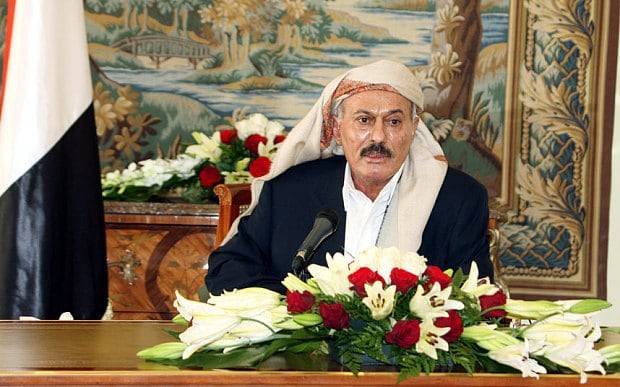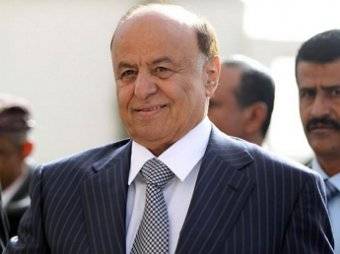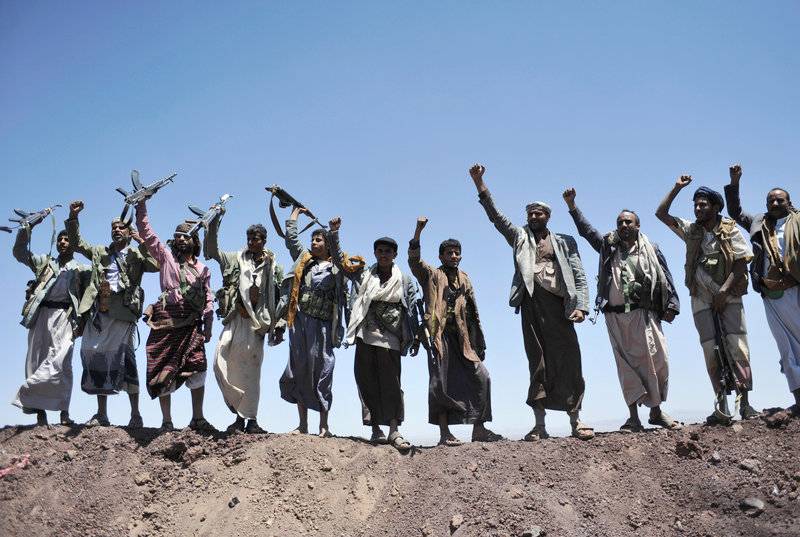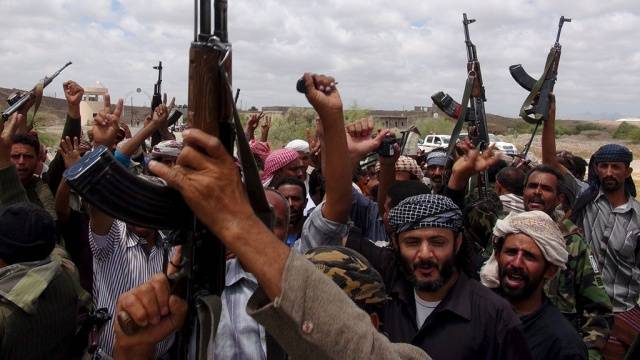The war in Yemen: should Russia get involved in a conflict?
The war in Yemen is another result of the “color revolutions” that swept across the Arab world in 2011 and were nicknamed “the Arab Spring” by the Western media. As a result of this “spring”, many once stable, albeit tough, Arab political regimes collapsed. Egypt, Tunisia, Libya ... President Al-Assad was never overthrown in Syria, but for six years a bloody civil war continues, turning millions of people into refugees and claiming hundreds of thousands of lives. The same fate befell Yemen.

Yemen has always been restless. One of the most backward and archaic regions of the Arab world, Yemen has long been shaken by internal political conflicts. After the unification of North Yemen (YAR) and South Yemen (YPRS) in 1990, conflicts between various political forces flared up repeatedly. In 2004-2010 in northwest Yemen, the government’s armed conflict with local Shiite tribes continued. He seemed to be able to pay off, but in the 2011 year, when the Middle East and North Africa were shaken by opposition speeches, which took place almost according to the same scenario, the situation in the country again sharply deteriorated. In 2012, Ali Abdullah Saleh (born 1942), who was the permanent president of the Yemen Arab Republic from 1978 of the year, and united Yemen from 1994, left his post.
The biography of Saleh is very similar to the biography of Gaddafi, Mubarak, Hafez Asad. Professional military, tanker, he was a representative of secular Arab nationalists. In 1978, 36-year-old Saleh, who commanded the Taiz military district, led another military coup and seized power in the country. Since then, he managed to hold her tightly enough, and only after 35 years, in 2012, did Saleh force the Arab Spring to withdraw. The new head of state was General Abdrabbo Mansur Hadi, who also came from the military, but not the YAR, but the Democratic Republic of Yemen, after the unification of the country he became vice president under President Saleh.

Yemen is a very complicated country. The lack of oil reserves and the presence on the periphery of the Arab world led to numerous economic problems of the country. The standard of living in Yemen is extremely low - and this is against the background of a very high fertility even by Arab standards. The population of the country is young and passionate. Yemenis have long constituted a significant part of the militants fighting in various parts of the Islamic world - from West Africa to Afghanistan, Pakistan and even the Philippines.
On the other hand, social relations in Yemen are archaic, in many respects they retain their tribal character, and this is manifested to an even greater degree than in other Arab countries. In confessional terms, the population of the country belongs to the three main groups - these are Shiite-Zaidis in the north of the country, the Sunni Shafi'i madhhab and the Salafis. Each of these groups has its own political interests. President Saleh for a long time managed to maintain at least the appearance of political unity of the country, relying on the support of the armed forces. But then the situation changed. Even the formal unity of Yemen was violated after the departure of Abdullah Saleh from the presidency of the country.

The armed conflict in Yemen flared up with a new force in 2014, when Shiite Zeidites again rose in the north of the country, also called “Hussites”, in honor of the late founder of the movement Hussein al-Husi (1956-2004), killed back in 2004. Having occupied the country's capital Sanou, the Hussites entered into an alliance with supporters of former President Ali Abdullah Saleh, which was a big plus for the rebels - they were able to use the help of experienced officials and officers who supported Saleh. Quickly enough, the Houthis managed to establish control over virtually the entire northern part of Yemen, after which they entered South Yemen and began to assault Aden. This city, at one time the former most important British base in Southern Arabia, began to storm 15 February 2015 of the year, and already 26 February 2015 began the invasion of Yemen coalition forces of the Arab states.
The main initiator of the invasion is Saudi Arabia, whose confrontation with the Hussites is both religious, ideological and pragmatic. For Riyadh, the war against the Hussites is another episode in a longstanding confrontation with the Shiite part of the Islamic world, and also an attempt to prevent the spread of Iranian influence on Yemen (Iran has a very serious influence in Iraq, Lebanon and Syria, and if pro-Iranian is finally established in Yemen government, it will be a serious blow to the position of the KSA). However, Iranian assistance to the Huthis should not be overestimated. Of course there are supplies weaponsthere are instructors from the Iranian Revolutionary Guards Corps, but no more. Sending its armed forces to fight in the Arabian Peninsula, Iran is not going to.
In turn, Saudi Arabia secured the support of a number of Arab and African states. The anti-Husite coalition was based on the armed forces of Saudi Arabia, the United Arab Emirates and the remnants of the government forces of the ousted President Mansour Hadi. It would seem that the fate of the Hussite rebels was a foregone conclusion - a too impressive coalition took part in the invasion of Yemen. But the “Saudi blitzkrieg” was drowned - for two years now, the coalition of Arab states has not been able to overcome the resistance of the Hussite rebel army. And this despite the fact that in addition to Saudi Arabia and the UAE, the armed forces of a number of other countries of the Islamic world take part in the conflict. The United States of America, which sent the Saudi coalition to help Aviation and special forces. As a result of hostilities, many thousands of civilians were killed, the infrastructure of an already poor Arab country was destroyed.
Hushits are not the only parties to the conflict. In addition to them, militants of Al-Qaeda (banned in the Russian Federation), Islamic State (prohibited in the Russian Federation) and a number of other radical groups are actively fighting in Yemen. According to the complexity of the “layouts”, the situation in Yemen is almost worse than the Syrian one. This circumstance is one of the key obstacles to more active Russian intervention in the Yemeni conflict. Yemen has become another “battlefield” between Saudi Arabia and Iran, so if Russia suddenly starts supporting one of the parties to the conflict, then this will definitely mean a deterioration in relations with either Riyadh or Tehran. This development is clearly not part of Moscow’s plans.

Meanwhile, “dragging” Russia into the Yemen conflict is not against almost all the belligerents. On the one hand, the Hussites need any military, financial, informational support, so they are ready to cooperate with anyone. But, unlike the unambiguously pro-Russian Bashar Assad, it is impossible to call the Hussites pro-Russian. This is generally the "dark horse" of the Middle East policy, which pursues exclusively its goals. It is unlikely that the Hussites can even be called pro-Iranian forces with confidence. Therefore, if Russia suddenly began to help the Hussites, then this absolutely would not mean that if they won the victory, the Hussites would become Russia's allies and, for example, would allow Russian ships to use the port in Aden (although at one time the naval base was located in Aden THE USSR).
Opponents of the Hussites from among the supporters of Abdrabbo Mansur Hadi are the former military-political elite of South Yemen, which the memory of the Soviet aid to the Democratic Republic of Yemen in 1970-1980-s links with Russia. Many of them studied in their time in the Soviet Union. Naturally, they also dream of Russia's intervention in the conflict, only on their side. Finally, there are also supporters of Abdullah Saleh, who also count on the help of Russia, only they are striving more to emphasize the need to protect Yemen’s sovereignty from Saudi Arabia and the United States behind Riyadh.
However, politically, the role of a mediator in the Yemeni conflict, equally distant from all opposing sides and advocating an end to the war, is much more beneficial for Russia. Actually, Moscow and so in every way demonstrates its desire for neutrality in the Yemeni conflict. If the United States immediately and unconditionally sided with Saudi Arabia, began to provide it with comprehensive support, then Russia back in April 2015, condemned the air strikes inflicted by Saudi Arabian aircraft on Yemeni settlements. Moscow also supported the idea of introducing a UN embargo on arms supplies to Yemen.
Russia has always opposed the active actions of the coalition and criticized the idea of “liberation” of the strategically important Hodeidah province and the capital of Sana'a. Of course, the US is interested in the complete defeat of the Hussites, since the latter are associated by Washington exclusively with Iran and are direct opponents of Saudi Arabia. Against this background, Moscow has a much more balanced position. In particular, Russia retains both the Hussite-controlled Embassy in Sanaa and the consulate in Aden, controlled by the anti-Hussite coalition. By this, Moscow seems to emphasize that it does not single out any of the parties to the conflict and is ready to deal with representatives of both parties.
The dialogue with Saudi Arabia, which is gradually changing its policy in the Middle East, is also interesting. Despite difficult relations with Riyadh, Russia recently received Saudi Arabian Foreign Minister Adel al-Jubeira, who stressed that Saudi Arabia was interested in ending the conflict. The words of the Saudi Minister are not far from the truth. Two years of participation in hostilities in Yemen did not bring Riyadh the desired results. Participation in the war does not come cheap to Saudi Arabia, the political prestige of the kingdom suffers from the defeats of the Saudi troops and the inability to cope with the rebels for two years. More and more representatives of the top circles of KSA are beginning to be inclined in favor of ending the unprofitable political and economic points of view of the military operation in Yemen.
Since Moscow maintains relations with both Iran and Saudi Arabia, its position in many respects becomes unique. For example, the United States and the United Kingdom can no longer claim the role of mediators in the Yemeni conflict, since they supported Saudi Arabia. Many Islamic countries that have incorporated their units or equipment into the coalition forces sent to Yemen have lost their actual ability to mediate. Thus, Russia is perhaps the only serious state capable of facilitating the settlement of the conflict at the expense of developed ties with its parties - with former Democratic Republic of Yemen politicians, with Salekh’s supporters, and with the Hussites. We should not forget that our country has a great experience of participating in Yemeni conflicts.
In particular, the Soviet Union in its time provided tremendous military support to the Yemen Arab Republic, where the anti-monarchist revolution took place in 1962. It was relying on the support of Egypt and the USSR that the YAR succeeded in repelling the attempts of monarchists to take revenge. Then, with the direct support of the Soviet Union, the People’s Democratic Republic of Yemen (YPRS) was proclaimed in South Yemen. And in the YAR, and in the Democratic Republic of Yemen for the 1960-e - 1980-e. visited a large number of Soviet military personnel and civilian specialists - military advisers and instructors, technical and maintenance personnel. The Soviet naval base was functioning in Aden (NDRJ). When civil war broke out in 1986, the Soviet Union played an active role in pacifying the country, including through the limited presence of its military personnel. With the participation of the Soviet Union in the year 1990 was carried out and the unification of North and South Yemen.
Thus, our country has not only a great experience of participation in Yemeni politics, but also all the reasons to express itself more actively in it. Another thing is that this intervention in Yemeni affairs should be purely diplomatic in nature, without isolating one of the parties to the conflict, without sending any weapons and, moreover, troops. If Russian diplomatic efforts in Yemen are successful, this will enhance the authority of our country on the international stage and, especially, in the Middle East.
- P P 'SЊSЏ RџRѕR "RѕRЅSЃRєRёR№
- http://www.telegraph.co.uk, Hani Mohammed/AP
Information